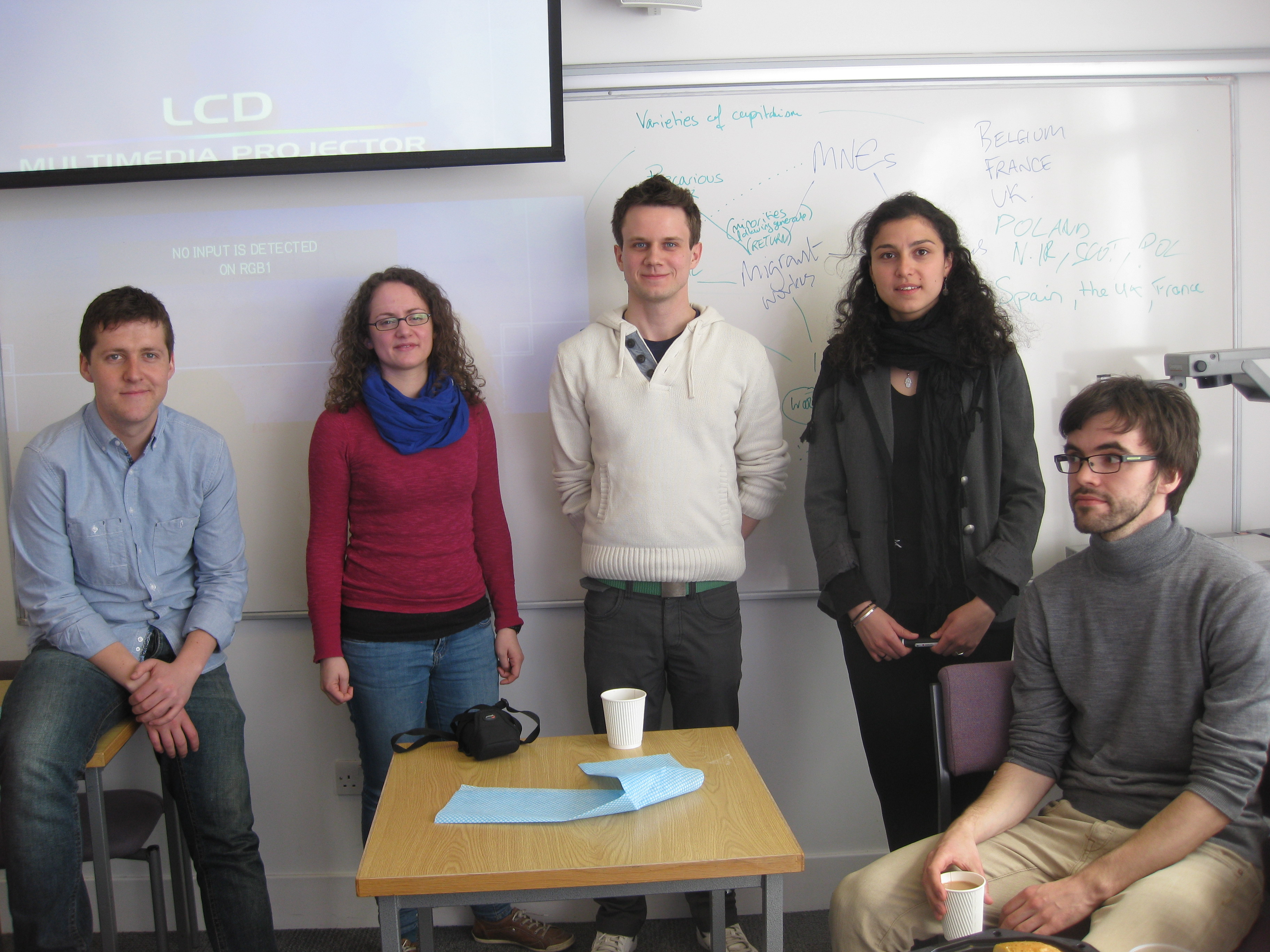Theme Leader: Prof. Paul Stewart, Strath
Researchers: Dr Olena Fedyuk, Strath; Karima Aziz, Londonmet; Radek Polkowski, Strath; Ben Egan, KU Leuven; Mateusz Karolak, UWR; Sahraoui, LondonMet
Specific scientific objective:
• to explore new developments, including those emerging from the economic crisis, with regard to inclusion/exclusion at work, particularly the consequences of unemployment, migration and precarious work and, increasingly, inequalities arising from age (both young and older workers), ethnicity and gender.
Background:
The specific research methodologies are to ensure ESRs’ familiarisation with and necessary skills to provide a comparative analysis of current European labour migration databases and statistics, and the skills for accessing research participants from hard to reach migrant populations. Methodologies will include an examination of occupational and skills profiles by country (UK, Belgium, Poland) providing tracking of migrant work and employment; analysis of media discourse about migration (discourse analysis) and the images of migrant workplaces in local media (visual sociology); case studies of migrants’ workplaces in Belfast, Edinburgh, London, Brussels and Wroclaw in relevant sectors (including hospitality and personal services, agriculture, construction, IT) as the sectors involving high migration levels from new member states of the EU to the UK, France and Belgium); and biographical narrative interviews with migrant employees in the UK and Belgium. Close attention is given to the intersection of economic, social and institutional factors thus demanding an inter-disciplinary perspective. Cross-national comparative methodology will be utilised. National datasets will be used to establish employment profiles of ethnic minority, migrant, female, younger and older workers across the EU27 (EUROSTAT, OECD, ILO datasets). These statistics will be used together with biographical narratives (on inclusion-exclusion) from workers and their union representatives in the UK and Spain for the programme period.
Extract from Changing Employment in Europe report:
One year on from the launch of ChangingEmployment, Theme 2 ESRs have made encouraging progress towards developing their collective and individual projects. Out of this has emerged a promisingly rich picture of social and economic inclusion and exclusion in Europe and this will be explored in the team’s collective project. This will be presented in both textual form and through the medium of film documentary. The output will cover issues of labour market inclusion and exclusion, its consequences for wider social and cultural participation as well as subjective experiences of people living through a number of extraordinary personal, social and community changes. Thus a holistic analysis of the multiplicity of ways in which inclusion and exclusion affects migrant workers and ethnic minorities in Europe will emerge. To better understand the myriad ways in which a range of heterogeneous factors can affect one’s place in a society, the project will compare experiences of EU and non-EU citizens, workers of different skill sets, men and women of different ages, those leaving their countries, in addition to those who return. This will all be understood in terms of the social, cultural and economic intersectionality of the dynamics influencing inclusion and/or exclusion. A broad range of issues such as precarity, commodification and marketisation will be engaged critically so as to be able to evaluate their effects on the working lives of migrant workers across Europe.
Dissemination: regular communication, exchange of literature and sharing of knowledge within the team led to the emergence of a coherent structure for the project. Recently, the team worked together on an application for two international conferences (The 17th Nordic Migration Conference and the ECPR - European Consortium for Political Research - conference in Glasgow) to disseminate the initial findings of the work undertaken to date. Since the last meeting face-to-face meeting of the team during the Network School in Evry-Paris, each member has been working on a chapter proposal for the Theme’s book. The agreed deadline for these proposals is end of February. Meeting this goal has further clarified the structure of the book including the involvement of key external (non ChangingEmployment actors). To assist this method, network contacts within European academia, built up thanks to the Marie Curie project through participation in a range of conferences and training events, is assisting in the deliberation of critical external contributions.
In mid-February the team met at the ECPR Winter School on Methods in Vienna. The agenda for a series of meetings accompanying this training session is to discuss the structure of the book and its content.
Find out what else Theme 2 ESRs are currently working on.

Theme 2 Fellows, L to R : Ben Egan, Karima Aziz, Radek Polkowski, Nina Sahraoui, Mateusz Karolak